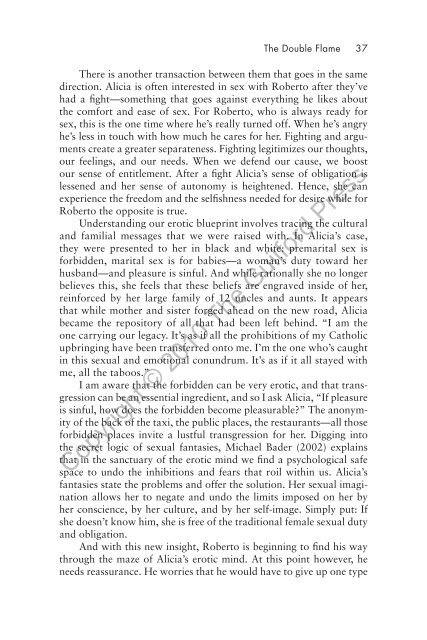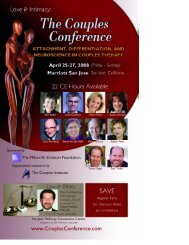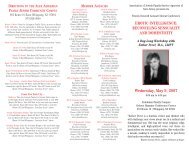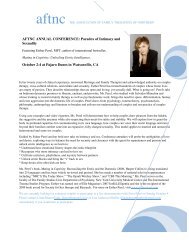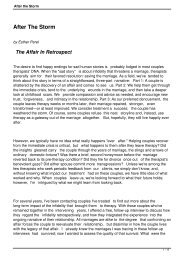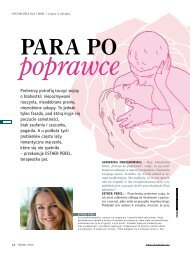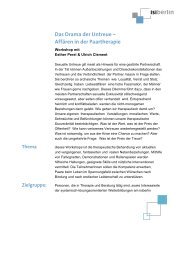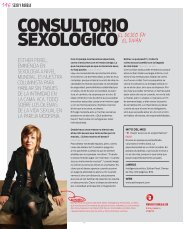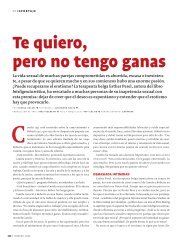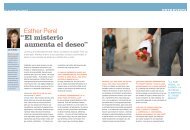The-Double-Flame 2.pdf - Esther Perel
The-Double-Flame 2.pdf - Esther Perel
The-Double-Flame 2.pdf - Esther Perel
Create successful ePaper yourself
Turn your PDF publications into a flip-book with our unique Google optimized e-Paper software.
<strong>The</strong> <strong>Double</strong> <strong>Flame</strong> 37<br />
<strong>The</strong>re is another transaction between them that goes in the same<br />
direction. Alicia is often interested in sex with Roberto after they’ve<br />
had a fight—something that goes against everything he likes about<br />
the comfort and ease of sex. For Roberto, who is always ready for<br />
sex, this is the one time where he’s really turned off. When he’s angry<br />
he’s less in touch with how much he cares for her. Fighting and arguments<br />
create a greater separateness. Fighting legitimizes our thoughts,<br />
our feelings, and our needs. When we defend our cause, we boost<br />
our sense of entitlement. After a fight Alicia’s sense of obligation is<br />
lessened and her sense of autonomy is heightened. Hence, she can<br />
experience the freedom and the selfishness needed for desire while for<br />
Roberto the opposite is true.<br />
Understanding our erotic blueprint involves tracing the cultural<br />
and familial messages that we were raised with. In Alicia’s case,<br />
they were presented to her in black and white: premarital sex is<br />
forbidden, marital sex is for babies—a woman’s duty toward her<br />
husband—and pleasure is sinful. And while rationally she no longer<br />
believes this, she feels that these beliefs are engraved inside of her,<br />
reinforced by her large family of 12 uncles and aunts. It appears<br />
that while mother and sister forged ahead on the new road, Alicia<br />
became the repository of all that had been left behind. “I am the<br />
one carrying our legacy. It’s as if all the prohibitions of my Catholic<br />
upbringing have been transferred onto me. I’m the one who’s caught<br />
in this sexual and emotional conundrum. It’s as if it all stayed with<br />
me, all the taboos.”<br />
I am aware that the forbidden can be very erotic, and that transgression<br />
can be an essential ingredient, and so I ask Alicia, “If pleasure<br />
is sinful, how does the forbidden become pleasurable?” <strong>The</strong> anonymity<br />
of the back of the taxi, the public places, the restaurants—all those<br />
forbidden places invite a lustful transgression for her. Digging into<br />
the secret logic of sexual fantasies, Michael Bader (2002) explains<br />
that in the sanctuary of the erotic mind we find a psychological safe<br />
Copyright © 2010 <strong>The</strong> Guilford Press<br />
space to undo the inhibitions and fears that roil within us. Alicia’s<br />
fantasies state the problems and offer the solution. Her sexual imagination<br />
allows her to negate and undo the limits imposed on her by<br />
her conscience, by her culture, and by her self-image. Simply put: If<br />
she doesn’t know him, she is free of the traditional female sexual duty<br />
and obligation.<br />
And with this new insight, Roberto is beginning to find his way<br />
through the maze of Alicia’s erotic mind. At this point however, he<br />
needs reassurance. He worries that he would have to give up one type


